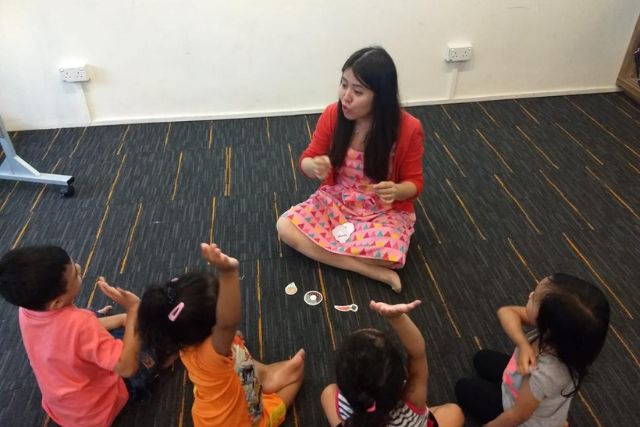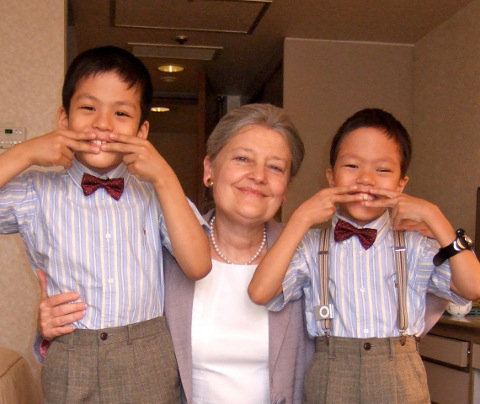While there are many pros to having your children looked after by one or both sets of grandparents, it is by no means an easy road for many parents to take. One of the main grouses we hear is that grandparents have the tendency to overindulge their grandchildren.
Or sometimes, it’s not about spoiling the kids, but simply that grandparents come from a very different perspective of parenting on areas that matter to you, like discipline, diet or academic achievement.

In the heat of the moment, hurtful accusations can be made and relationships strained, and it’s often frustrating and painful for all parties concerned. While there is no quick-fix one-size-fits-all solution to such issues, here are ways to help you navigate through such times.
Grandparents Who Spoil Kids: How To Deal With Them
#1 Practice Open Communication
Good communication is the benchmark of any relationship, and the key to cultivating a healthy and helpful attitude towards the grandparents, and vice versa.
Don’t expect your parents to read your mind when it comes to making decisions about how to raise their grandchild, and similarly, don’t assume you understand their intentions or rationale for the way they relate to your child.
As the parent, the onus is on you to take the initiative in discussing big issues with grandparents, such as discipline methods, the offering of snacks and screen time, and the values you want to inculcate in your child.
Set clear boundaries and systems of consequences for your child, and ensure that your parents are in the know and on the same page.
Communicating openly about big issues such as discipline matters; e.g. what offence warrants punishment, and nitty-gritty items such as toys, snacks and videos; e.g. what videos can child watch and for how long.
⇒ Related Read: Top 5 Common Parenting Discipline Mistakes
If grandparents are buying too much stuff like toys and games for grandkids, communicate your child’s real needs to your parents. Money can be better spent on a haircut or a pair of school shoes which will meet an instrumental need.
#2 Avoid comparison
Of course, you may feel the urge to cite how your parents raised you in the past and bring up their obvious double standards. But it’s not that simple comparing a parent’s role and a grandparent’s.
You don’t want to start WW3 by making unnecessary reference to and comparisons with the past. Neither should you compare your parents with your friends’ parents who are also caring for their grandchildren. No two families are exactly alike, and neither are their parenting – or grandparenting – styles.
“Over time, I see that my parents come from a different perspective because of the times they lived in,” says Karen, 36.
“My parents remain in the mindset when they were parenting their kids, which was very much more relaxed than how we parent nowadays.”
The mother of three adds, “During their time, handheld devices were not an issue in taking up our attention, so they are very quick to permit our children to use handheld devices whenever they request.”
#3 Nip Triangulation In The Bud

When parents say “no” to their children, children may sometimes try their luck with the grandparents. In renowned Family Therapist Murray Bowen’s terms, this is known as triangulation – when grandparents are roped in by kids to provide the tension relief craved by the dyadic relationship (parent-child relationship).
Ms Portia Martil, Montessori Teacher, suggests for parents and grandparents to communicate privately, and not in the children’s presence.
“Parents can request for grandparents to run things through them before doing or buying things for their kids. Do it offline so that the kids do not get hurt and hold it against the parents,” says Ms Martil.
She further encourages grandparents to take the message back to the kids with the reasons why they are not able to do or buy it as if it is coming from them. This sends the message to the kids that grandparents would not be manipulated and it spurs.
#4 Offer Alternatives To Grandparents
Going back to the first point, communicating with your parents is not a one-off thing, but an ongoing process. Along the way, you will learn that many of the ways in which you choose to bring up your child may be completely new to your parents.
For instance, when it comes to rewards, grandparents may instantly think of an expensive toy as the best gift, which goes against your preference to not indulge your child in too many toys.
Instead of just telling your parents “Please don’t buy him any more toys”, how about offering them some alternatives to consider? For example, you could suggest that they invest in memorable experiences in lieu of a gift, such as a trip to the zoo, an art workshop or swimming lessons.
#5 You Don’t Need To Put Your Foot Down Every Single Time

Grandparents overindulge grandkids in a myriad of ways – buying too many toys; giving them too much junk food like ice-cream and cookies; allowing kids to skip main meals; allowing them way too much screen time; letting them stay up way past their bedtime… the list goes on.
So if you are going to put your foot down every single time, your shoes might well wear out pretty fast! As with any relationships, both sides need to learn to give and take, and occasionally, compromise. Not every battle needs to be fought.

Together with your spouse, decide on the non-negotiables when it comes to your kids. Perhaps you might be willing to let your parents buy the children their favourite toys, but insist on them abiding by your chosen methods of discipline.
And for some issues, negotiation and compromise is the best way to move forward with everyone’s pride and the relationship still relatively intact. For example, allowing snacks but only at least two hours before the next meal, or only going for healthy foods like homemade granola.
Reon Tay, father to a 5-year-old son and a 2-year-old daughter, believes that it is important to choose the right battles in order to win the war against grandparents spoiling grandkids.
He shares, “I do not like it when my parents buy toys for my children when it is not their birthday. But I do not stop them from doing that because it is not a major issue. However, I make it clear to my parents to not interfere when I discipline my children.”
#6 Be More Open To Compromise

Negotiate with grandparents for the Best Alternative to a Negotiated Agreement, or BATNA for short. For example, if grandparents want to give grandkids ice-cream treat, instead of a flat no and being a killjoy, adjust the portion size by asking them to give only a small amount or going for healthier alternatives such as homemade sorbet.
#7 Explain or Show Them the Consequences
Grandparents may overindulge their grandchildren simply because they are not aware of the full extent of the repercussions and aftermath. Showing grandparents the consequences of their overindulgence can help them understand why you’d rather manage the kids in a certain manner.
For example, if grandma or grandpa thinks it is alright to stretch the kids’ bedtime, you may want to invite them over to have a glimpse of how a delayed bedtime can trigger a meltdown – the wailing in the car ride home, the resistance to bathe, the inability to pipe down and the night terrors from over-stimulation and over-tiredness.
Another example is if your parents think it is no issue to let the children eat chocolate cake just before bedtime, perhaps it is because they don’t want them to go to sleep hungry or feeling sad about having no cake.

You can share with them how the sugar high causes your children to be unable to sleep at their usual time, and consequently result in very grumpy behaviour or multiple meltdowns the next day.
This will help them understand your “no sweets after dinner” rule. Perhaps, in future, they should remember to offer the cake at tea time or leave it for the next day.
Hillary, 38 and mum of three, shares her struggles with her mum. “My mum is a straight talker. She believes that she has eaten more grains that I’ve eaten rice and doesn’t need to take instructions from me. In the past, if I were to say, “Don’t let my son eat this cookie”, she would still shove the cookie into his open mouth! I would be flabbergasted and protest with angry tears…”
But now, Hilary has realised that her Mum reacts that way when Hilary tries to instruct her mum or change her behaviour because it makes her mother feel fearful and out of control.
“I am learning to be patient and accepting of who my mother is, and she is learning to be a safe and loving grandma for my children to come to. We have come a long way – and our relationship is still a work-in-progress.”
It’s essential that you take the time and effort to also understand where your parents are coming from, not just to explain your own stand on things.
While such conversations may be difficult to have, they are important and needful stepping stones in building strong foundations for your family’s relationships and set the stage for the rest of your children’s growing years.
⇒ Related Read: How to be a better parent: 10 Do’s and Don’ts
#8 Remind Gently

Grandparents need their dignity. Avoid putting down or scolding grandparents when they overstep their boundaries, especially in the presence of the grandkids.
Cai Biyi, stay-at-home-mother to a 5-year-old daughter, relates that it helps when she gently reminds her mother to treat all her grandkids fairly and not be biased in favour of any of them.
You can create happy, healthy and fulfilling relationships across the three generations by drawing clear boundaries. Some of these conversations may seem intimidating to start and you may be tempted to sweep such issues under the carpet.
There may also be times when you have already shared all the above with your parents, and they still disregard or even intentionally go against your wishes. Such cases may be indicative of deeper heart issues like respect for authority or over-protectiveness.
Change may not happen overnight, but rest assured, you will find taking that first step can indeed spare you much heartache.
By Rachel Lim and Dorothea Chow.
If you find this article useful, do click Like and Share at the bottom of the post, thank you.
Like what you see here? Get parenting tips and stories straight to your inbox! Join our mailing list here.






















































